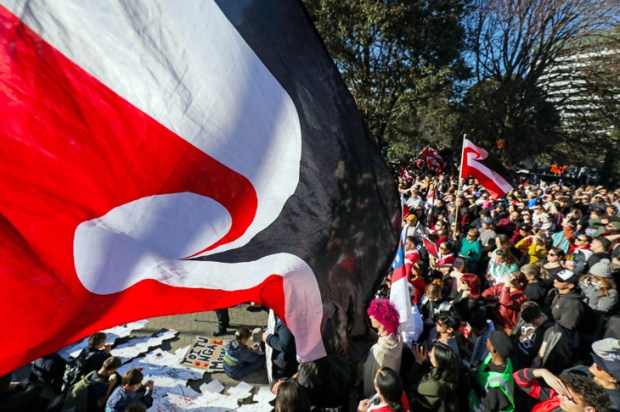Two media commentators on the National Public Radio (NPR) network – America’s closest equivalent to the ABC – recently spent an hour discussing right-wing media platforms. They oozed smugness and disdain: smugness in the assuredness of their own lofty enlightenment and disdain for the gullible, ignorant deplorables supposedly held in the grip of the far-right commentariat.
The two presenters heroically forced themselves to monitor right-wing media for 12 hours. But despite professing to seek an understanding of how the ‘Maga media’ viewed the world, they instead treated the exercise as an opportunity to confirm their own prejudices and share snide jokes about the crassness of the American right.
Rarely has the effete elitism of the intellectual left been on more brazen display. Yet the self-satisfied hosts of NPR’s On the Media were not insightful enough to see what should have been screamingly obvious.
Despite acknowledging that conservative political commentators had an audience five times bigger than those on the left, they never paused to wonder why that might be the case. Curiosity, arguably the most essential quality of good journalism, was notably absent – smothered by their overweening conceit.
Blinded by hubris, they made no attempt to understand the reason for the ascendancy of the right-wing media. It appeared not to occur to them that it might be a natural and inevitable backlash against the overwhelming woke bias of mainstream media outlets.
All they could do could was engage in sneering and ridicule. And as their show continued, they dug themselves into an ever-deeper hole of denial and condescension.
To be sure, many of the right-wing American influencers whose audio clips were played in the programme came across as repugnant loudmouths. It was a case of ghastly people on the left attacking ghastly people on the right. You wouldn’t want to be marooned on a desert island with any of them.
There could hardly have been a starker illustration of how the once crucial centre ground has been vaporised in the Western media and political debate captured by the extremes of left and right.
The same is true, albeit to a lesser extent, in New Zealand, where I live, and by all accounts in Australia too. People are either disengaging from the media altogether – a trend obvious from steadily shrinking TV news audiences and declining newspaper sales – or are being driven to partisan and often unreliable online platforms that make no pretence of balance or objectivity.
A new phrase has entered the vocabulary of media watchers: news avoidance. I can write with some authority about this phenomenon because I exemplify it. After a lifetime in journalism I gave up watching the TV news in 2023. More recently I abandoned my decades-long habit of tuning into Radio New Zealand’s flagship news and current affairs show Morning Report. In both cases the naked bias, especially in interviews, became too much. Jacinda Ardern, the darling of the media left, never experienced anything remotely resembling the hectoring, aggressive treatment I heard Christopher Luxon being subjected to.
It’s not that I’m a fan of the NZ government (I’m not) or want my news with a right-wing slant. If I wanted that, I could tune into the privately owned NewstalkZB network, whose conservative-leaning breakfast show has an audience that greatly outnumbers that of state-owned RNZ (echoes of the US). I choose not to because I want my news free of spin from either end of the political spectrum. In the words of the old police detective trope, ‘Just give me the facts, ma’am.’ I’ll decide for myself what conclusions to reach.
I still scan the daily papers, but finding political stories that are free of spin is a constant challenge. Often I know from the byline that I can’t expect a straight report. (Case in point: Andrea Vance, national affairs editor for the country’s biggest newspaper chain, who recently wrote a dementedly overwrought piece about pay equity in which she went totally rogue and insulted six female cabinet ministers using the c-word.)
If surveys are any indication, I’m not alone in deciding I’d rather have no news at all than have it filtered to me through media I can no longer trust. RNZ’s radio audience has plummeted in recent years while New Zealand newspaper circulation figures long ago declined to the point where they became too embarrassing to disclose. Public trust in the media is on an even more precipitous downward trajectory.
The situation appears similar in Australia, where I read last August that audience figures for ABC’s Radio National were in free fall. Trouble is, that description appeared in a Sky News Australia report quoting the media writer for the Australian. Both of those news outlets are positioned on the right and doubtless enjoy scoring points against the leftist state broadcaster.
There’s part of the problem, right there. It’s becoming almost impossible to find news outlets that can be considered free of any political or ideological taint.
It wasn’t always like this. For decades, mainstream journalism adhered closely to a model of objectivity and balance. Reporters received their training on the job from hard-nosed older colleagues and were sharply pulled into line if they allowed personal opinions to colour what they wrote. But that model was abandoned as journalism training shifted from the workplace to tertiary institutions where leftist academics taught aspiring journalists that there was no such thing as objectivity – or if there was, it was unattainable – and that their mission was to change society.
The concept of editorial balance was sneeringly dismissed as ‘both sides-ism’. The result, inevitably, was that idealistic journalists felt free to push ideas they agreed with and ignore or disparage those they didn’t like.
The products of that training (or should I say indoctrination?) now control newsrooms. They have no recollection of how things used to be because older, wiser journalists were deliberately marginalised or eased out of the business.
The typical journalist in 2025 is youngish, university-educated, female, and rigidly intolerant of ideas she doesn’t agree with. If asked why she decided to become a journalist, she will very likely reply that she was interested in pursuing social justice.
We are now seeing the entirely predictable result as what used to be mainstream media outlets drift further and further away from the communities they once served.
And like the preening NPR commentators in the US, they lack the self-awareness to realise they are committing slow-motion suicide.
Got something to add? Join the discussion and comment below.
You might disagree with half of it, but you’ll enjoy reading all of it. Try your first month for free, then just $2 a week for the remainder of your first year.













